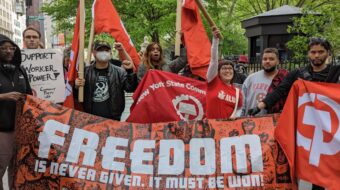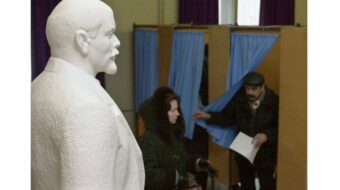The season finale of the third season of Netflix’s “Orange is the New Black” (OITNB) was spectacular, to say nothing of the other wonderful episodes leading up to it.
This show grapples with the brutality of prison life through the eyes of the inmates of Litchfield prison. Motherhood, sexuality, poverty, and racism are all game as the show explores these issues with an unvarnished honesty that exposes the ugliness of the world as well as its beauty.
In addition, the series has a strong Marxist undertone that underlies much of the plotline. These themes explode in the season’s final episode.
OITNB utilizes the worker vs. capitalist dynamic in a far more nuanced and complex form than is found in many Marxist texts. This dynamic is played out in the character of Caputo, the warden of Litchfield prison. Caputo dances a line between compromising with the prison’s new corporate owners, for whom prison is a way to profit , and his fellow corrections officers, for whom the prison is a way for them to feed their families and pay rent.
This struggle expresses itself in his illicit relationship with the governor’s wife. A politician herself, she embodies bourgeois qualities of wealth and power, which both repulse and attract him. He longs for the ease of life and the security such wealth brings, especially given the precariousness of his employment, but obtaining this wealth will require him to become that which he loathes.
Ultimately, Caputo chooses the corporate owners over his fellow officers and receives the subsequent raise and bonus. This act of betrayal becomes the catalyst which gives the prison guards the strength to finally unionize. As the guards walk out on strike they leave the prison and its prisoners unattended.
It is Caputo’s own commitment to his corporate owners that causes his fellow officers’ rejection of them, thus proving the old Marxist adage that “capitalism contains within itself the seeds of its own destruction.”
The prisoners, now free of the administration’s watchful eye, proceed joyfully to flee the prison and sit on the beach of a nearby lake. Faces stream with joy they enter the water and begin splashing playfully. The workers’ decision to unionize has resulted not just in their liberation, but the whole community’s. It is the prisoners who share the most with the prison guards, who are also forced to be locked inside all day long.
The vision of socialism – workers sharing a common goal without competition or coercion – is often challenged on the basis that we are naturally selfish creatures. Without the police powers of the state and the coerced competition of capitalism, it is said, we would tear each other apart. We are not moral and autonomous human beings; we are no better than the hardened criminals of Litchfield prison who would descend into violence without proper supervision.
Yet in OITNB we find the reverse is true. Freed from the drudgery of our 9-to-5 routine we run joyfully to the water and sit in the sand enjoying our permanent vacation. The dark secret of our primitive desires is not competition and bloodshed but leisure. This longing for leisure terrifies the wealthy, who depend on coerced competition to keep the engines of their industry running.
Our liberation must happen in spite of bourgeois state power, not because of it. There is nothing such a state can do to make us safe or happy. The best it can do is step aside.
For one particular character, Hayes, liberation is not only physical but spiritual. Throughout the series she slowly plods through the process of converting to Judaism. At first it is simply a ploy to get the better, kosher meals at dinnertime but, in spite of herself, she grows to love this religion and her commitment becomes sincere.
Plunging into the water is her mikveh – the Jewish ritual bath – as she enters her new life as a Jewish woman. It is the prison administration which has kept her from this moral and spiritual transformation under the guise of teaching inmates morality and discipline by restraining them.
The opposite is clearly the case. When police violence ends and people are able to govern themselves their humanity and moral center are restored.
This brief review does not do this wonderful series justice, as the issues it addresses are far more numerous than we have space for. Besides grappling with complicated social issues, OINTB introduces extremely human, likable characters. It is unflinchingly honest in its portrayal of the prison system and those caught up in it.
In the end, the show offers a vision of hope to those who have the strength to stand up and speak out against power and wealth, for it is these people who liberate not just themselves, but also the masses around them.












Comments